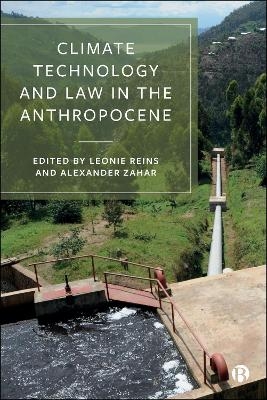
Climate Technology and Law in the Anthropocene
Bristol University Press (Verlag)
978-1-5292-3288-2 (ISBN)
- Noch nicht erschienen (ca. Juli 2025)
- Versandkostenfrei innerhalb Deutschlands
- Auch auf Rechnung
- Verfügbarkeit in der Filiale vor Ort prüfen
- Artikel merken
This book explores the unprecedented technological and legal changes required to achieve this. Featuring contributions from leading experts, the essays examine the intersection of technology, law, and environmental values, offering diverse viewpoints on navigating the Anthropocene.
Revealing the controversies of rapid technological adoption and legal reform, this is a crucial analysis of a complex future whose many dangers for our society are barely understood.
Alexander Zahar is Professor of International Law at Southwest University of Political Science and Law, in Chongqing, China, and a lawyer specializing in environmental litigation at Ashurst Australia. He is also a Lead Reviewer of greenhouse gas inventories, national communications, and biennial reports, as well as a Technical Expert of biennial update reports submitted by developing countries. He is the founder and editor of the journal Climate Law. His publications include Debating Climate Law (Cambridge University Press, 2021), co-edited with Benoit Mayer. Leonie Reins is Professor for Public Law and Sustainability at Erasmus School of Law. Prior to joining ESL she worked as an Assistant Professor at the Tilburg Institute for Law, Technology and Society (TILT) at Tilburg University. She obtained her FWO-financed PhD from KU Leuven, where she subsequently also worked as a Post-Doctoral Researcher. In addition Leonie worked as Legal Advisor at a Brussels-based environmental law and policy consultancy, where she was involved in projects on environmental, energy and climate change law and policy.
1. Introduction – Alexander Zahar and Leonie Reins
2. Legal Principles and Rules on the Regulation of Climate Technologies: Do They Exist? – Marion Lemoine-Schonne
3. Using Nature As Technology Versus Nurturing Nature: Ecosystem Services and Biodiversity Conservation – Felicity Deane and Justine Bell-James
4. A Radical Law Reform for Critical Raw Materials? The Case of Wind and Solar Pv – Seita Romppanen
5. Harnessing More Rivers for Renewable Energy and Irrigation – Alexander Zahar
6. Are Renewable Energy Technologies Compatible With Rewilding? Migratory Species, Local Ecosystems, and the Controversies About Dams and Wind Turbines – Phillip Paiement and Floor Fleurke
7. Between Scylla and Charybdis? Beccs, Climate Mitigation, and the Threat of Environmental and Social Harm – Emily Webster
8. Law of the Sea Vis-à-Vis Ocean-Based Technological Solutions, and Risks Arising From Technology in the Context of Knowledge Gaps About the Ocean/the Deep Seas – Bjørn-Oliver Magsig
9. Whither Law and Regulation on Carbon Capture, Utilization, and Storage? – Hao Zhang
10. What Are the Right Knowledge Practices for Carbon Capture and Storage? – Bettina Lange
11. Is Environmentalist Opposition to Nuclear Power Misguided? – Kaisa Huhta
12. Hydrogen: What Does Its Deployment at Speed and Scale Mean for Legal Systems? – Ruven Fleming
13. Gene Editing: Solution for Food Security and Energy-Crop Production or Pandora’s Box? – Mirta Alessandrini and Josephine Van Zeben
14. Cultured Meat: The Impact of a Game-Changing Technology on Law and Our Planet – Jonathan Verschuuren
15. Case for Srm to Be Fully Researched and Raised to a State of Deployment Readiness as an Important Technology of Climate Control – Kerryn Brent, Jan McDonald, and Jeffrey McGee
16. Using the Law to Encourage Experimentation and Innovation in Climate Technology – Gareth Davies
17. Ban on Coal: Case for and Against Restrictions on Coal Production, Sale, and Use – Daria Shapovalova
18. Should a Government Be Liable to Compensate the Owner of a Carbon-Intensive Industry That Is Required to Cease Operating Before the End of Its Expected Operational Life? – Ignacio Herrera-Anchustegui and Gunnar Eskeland
19. A Just Energy Transition: The Usefulness, and Limits, of the Concept of Energy Justice From a Legal Perspective – Laura Kaschny
20. Debates Over Intellectual Property and Climate Change, in a Geopolitical Context – Matthew Rimmer
21. Is the Trips Debate a Distraction? – Felicity Deane
22. The Interface of Climate-Related Technologies and International Trade Law: Tensions and Opportunities – Kateryna Holzer and Yulia Yamineva
23. Debating the International Climate Regime’s Technology Architecture – Leonie Reins and Alberto Quintavalla
24. Reimagining Technology Transfer Beyond Development – Morag Goodwin
25. Conclusion – Alexander Zahar and Leonie Reins
| Erscheint lt. Verlag | 1.7.2025 |
|---|---|
| Zusatzinfo | Not illustrated |
| Sprache | englisch |
| Maße | 156 x 234 mm |
| Themenwelt | Naturwissenschaften ► Biologie ► Ökologie / Naturschutz |
| Recht / Steuern ► EU / Internationales Recht | |
| Recht / Steuern ► Öffentliches Recht ► Umweltrecht | |
| Technik ► Umwelttechnik / Biotechnologie | |
| ISBN-10 | 1-5292-3288-0 / 1529232880 |
| ISBN-13 | 978-1-5292-3288-2 / 9781529232882 |
| Zustand | Neuware |
| Haben Sie eine Frage zum Produkt? |
aus dem Bereich


